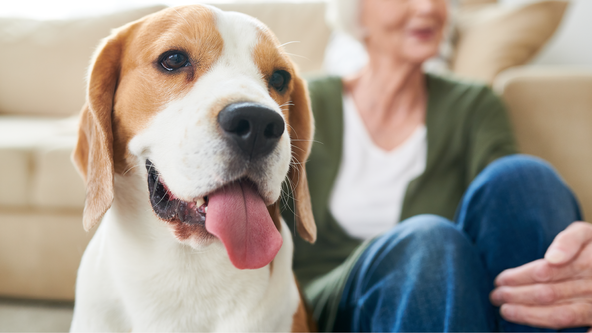Why Pets Are Awesome

Here are two more reasons to celebrate our furry, feathered, scaled, or slithery family members. May 1 through 7 is Be Kind to Animals Week, while the entire month of May is National Pet Month. Whether you have a pet (or a half-dozen) or just admire them, caring for animals benefits everyone.
Americans Love Their Pets
According to the American Pet Products Association, nearly three-quarters of U.S. households – 90.5 million families, own at least one pet. The average pet owner spends about $110 every month on pets, including food, cleaning supplies, toys, and other necessities. Nationwide, Americans dish out approximately $103.6 billion. That’s a lot of kibble!
The top five most common pets in America, according to WorldAtlas, are:
- Dogs
- Cats
- Fish
- Reptiles
- Other mammals, including rabbits and hamsters
How Pets Help Their Humans
Is there any better feeling than your dog happily wagging its tail? Or your cat purring on your lap on a chilly evening? In addition to being cute and snuggly, pets enhance our lives in many ways. Taking care of an animal is a big responsibility, but the benefits can be even greater.
Pets Can Reduce Stress
Most people love their pets, but there’s scientific evidence that pet ownership is good for your heart. According to the Centers for Disease Control and Prevention, pet owners are more likely to have lower blood pressure, cholesterol, and decreased stress levels.
Pets Provide Structure and Routine
Your pet needs regular meals with fresh water, exercise, playtime, and grooming. Owning a pet helps individuals stick to a normal routine. For people who have difficulty managing their time, pets provide structure.
Pets Get You Moving
Most pet owners are more active, whether it’s a twice-daily walk for your dog or trying to stay one step ahead of a mischievous kitten. You may find that it’s easier to incorporate exercise into your schedule, whether your activity involves your pet or not.
Pets May Help with Isolation
Spending time alone is healthy, but loneliness is detrimental to your well-being. Grief, depression, and anxiety are exacerbated by isolation and loneliness. Pets bring companionship, which helps protect against the harmful effects of loneliness, especially in older people.
Pets Can Ease Grief
Many pets sense emotional distress in their owners, including grief. Not only does having a pet help you maintain a sense of normalcy – morning walks, meal time – they’re a source of great comfort. Being responsible for a pet after losing a loved one helps some people regain a sense of purpose.
Service and Support Animals
Service animals (mainly dogs) have long been used to help owners with physical, emotional, or intellectual disabilities. Service dogs are trained to perform a specific job or function directly related to their owner’s needs. For example, a service dog for a hard-of-hearing individual may gently tug on their arm or leg to get their attention.
Emotional Support and Therapy Animals
Support animals provide emotional support and companionship that help reduce or alleviate physical or psychological condition symptoms. Unlike service animals, many types of animals may be used for emotional support. These include miniature horses, ferrets, hamsters, and rabbits.
Therapy animals are specifically trained to interact with sick or injured individuals. Hospitals, hospices, and assisted living facilities often host volunteers with therapy animals.
Planning for Your Pet’s Care
Pet owners have to plan for their pet’s care and comfort when they go on vacation or out of town. But who will care for your pet if you are hospitalized or incapacitated? And what happens to pets after their owners pass away? You may take legal steps to ensure their protection and care, just as you would for human loved ones.
Set Up a Pet Trust
You cannot leave money directly to your dog, cat, bird, or other pet. However, a pet trust provides for their care, keeping, and medical needs for the rest of their natural lives. Depending on the animal, that might be years. Smaller dog breeds, like Chihuahuas, can live to be 18 or 19 years old. African Grey Parrots typically live between 30 and 50 years, and Umbrella Cockatoos often live into their 60’s. Certain types of tortoises easily hit the century mark.
The most critical element of a pet trust is finding an individual who is able and willing to perform as a caregiver. Your pet trust should have detailed instructions and sufficient funds for that purpose.
Benefits of Planning Ahead
Planning for the future isn’t limited to pet owners. Most of us don’t want to add to our loved one’s stress and grief if we become incapacitated. Yet most Americans don’t have their final wishes in writing or even clearly defined.
Making plans for end-of-life care and other decisions isn’t easy to discuss. (You might find helpful conversation starters here.) However, you spare your loved ones from making difficult decisions under challenging circumstances. Equally important: you deserve to have your wishes respected in end-of-life care, burial versus cremation, and permanent memorialization options.